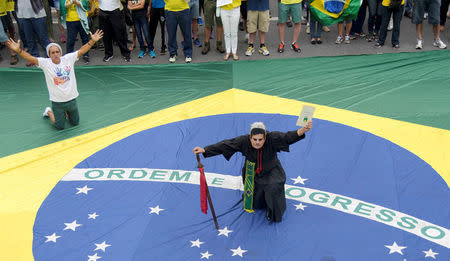Demonstrators march in Brazil to support corruption crackdown
By Paulo Prada RIO DE JANEIRO (Reuters) - Demonstrators protested across Brazil on Sunday to denounce corruption and a congressional vote perceived as an effort to intimidate judges and prosecutors leading graft probes. Dressed mostly in the national colors of yellow and green, thousands marched to demand accountability at a time when Latin America's biggest country is reeling from corruption scandals, political gridlock and a prolonged economic recession. In São Paulo, the country's largest city, about 15,000 people, according to state police, marched down the business thoroughfare of Avenida Paulista, unfurling a long banner reading "Corrupt Congress." At a seaside march in Rio de Janeiro, where two former governors were recently jailed on corruption charges, demonstrators waved banners with messages like "We are all Sergio Moro," the judge overseeing a historic investigation into kickbacks around the state-run oil company. The demonstrations are smaller than massive marches that erupted in recent years when an economic boom soured and once-successful leftist policies exhausted public finances. With the downturn, though, Brazilians are increasingly frustrated by an age-old culture of unpunished corruption. The problems this year helped topple former President Dilma Rousseff, who was impeached for breaking budget rules. They now plague the administration of President Michel Temer, her conservative successor, who many Brazilians already complain inspires little hope for change. In a statement, Temer said the demonstrations showed "the force and vitality" of Brazil's democracy. But protesters, many of whom hailed from the upper-middle and wealthy classes who took part in marches against Rousseff, argued much still needs to be done. "The struggle has to continue," said Iara Soares, a 56-year-old schoolteacher in Rio, where police declined to estimate a turnout. "We need a real renovation." Temer, who took over for Rousseff last May, has already lost four ministers to corruption allegations. Last week, Brazil's Supreme Court indicted Renan Calheiros, the president of the Senate, over long-standing graft charges. Then there was the uproar over a hasty vote last week by the lower house of Congress to gut an anti-corruption bill, amending it to enable prosecutors and judges to be punished for alleged abuses of authority. In Brasília, where police calculated roughly 5,000 protesters, one group carried a giant poster of a rodent bearing the Senate president's name. "We let these rats govern us for so long,” said Sonia, a demonstrator who declined to give her surname because she is a civil servant. "Lawmakers don't care what the people in the street think." (Additional reporting by Anthony Boadle and Marcela Ayres in Brasilia; Editing by Mary Milliken)




